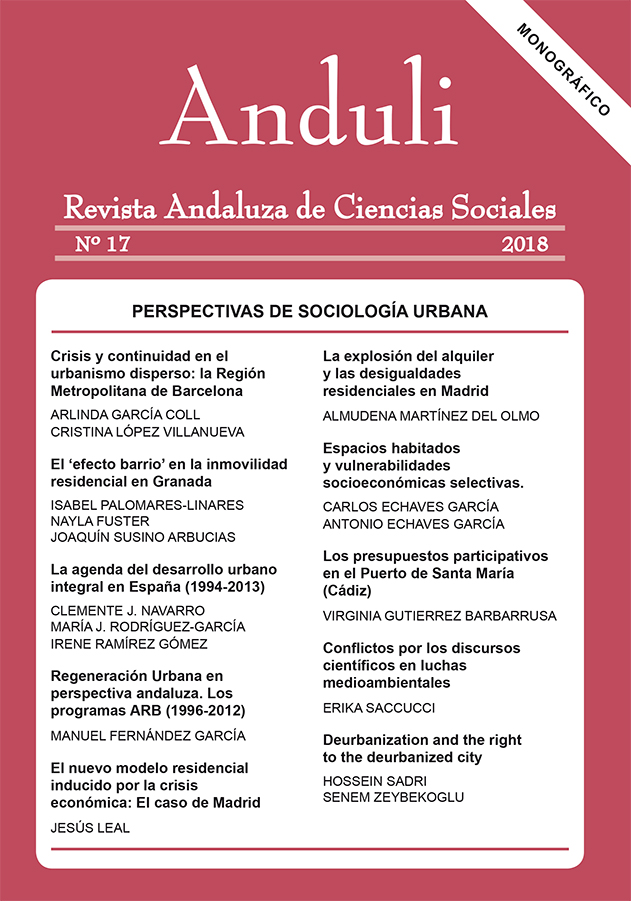Deurbanization and the right to the deurbanizaed city
DOI:
https://doi.org/10.12795/anduli.2018.i17.10Palabras clave:
deurbanization, de-urban design, right to the city, city, urbanizationResumen
Cities are historically created as a collaborative work of different generations and derive from the possibilities created bylocal and climatic conditions, social relations and culture. Today, urbanization may appear as a way of organizing everyday hierarchical, exclusive, discriminatory and exploitative life through industrialized mass production of temporary, privatized, homogenized, fragmented, and power-oriented spaces. This mind-set and application generates several social and ecological problems. This article discusses the right to the city concept, and links it to the deurbanization approach as a social and ecological answer to the problems associated with current urban development. The methodology is supported by a review of the literature and an analysis of examples of works created in the De-Urban Design Studio. Results indicate that the deurbanization approach envisions creating resilient, equitable, non-hierarchical cities composed of communities that replace consumption via harmony with nature, that replace individualism and competition viacollaboration and solidarity, and that replace hegemonic relations via an equitable distribution of power.
Descargas
Citas
Bookchin, M. (1992). Urbanization without Cities the Rise and Decline of Citizenship (revised edition). Montréal, CA; New York, NY, USA: Black Rose Books.
Bookchin, M. (2006). Social Ecology and Communalism (edited by Eirik Eiglad). Oakland, CA: AK Press.
Churkina, G. (2016). The Role of Urbanization in the Global Carbon Cycle. Frontiers in Ecology and Evolution, 3:144. doi: 10.3389/fevo.2015.00144. Recovered from:
https://www.frontiersin.org/articles/10.3389/fevo.2015.00144/full
Gottdiener, M. (1993). A Marx for Our Time: Henri Lefebvre and the Production of Space. Sociological Theory, 11(1), pp. 129-134.
Hopkins, R. (2008). Transition Handbook: From Oil Dependency to Local Resilience. Foxhole, Dartington, Totnes, Devon, UK: Green Books.
Lefebvre, H. (1968). Le Droit a La Ville. Paris, FR: Anthropos.
Lefebvre, H. (1991). The Production of Space (translated by Donald Nicholson-Smith). Oxford, OX, UK; Cambridge, MA, USA: Blackwell.
Lefebvre, H. (1996). Writings on Cities (translated and edited by E. Kofman and E. Lebas) Malden, MA, USA: Blackwell.
Marcuse, P. (2012), Whose Right(s) to What City? In Cities for People not for Profit: Ciritcal Urban Theory and the Right to the City, edited by: Neil Brenner, Peter Marcuse and Margit Mayer, Routledge, New York.
Marx, Karl. (1887). Capital: A Critical Analysis of Capitalist Production. Translated by Samuel Moore and Edward Aveling. London, LO, UK; Sonnenschein, Lowrey.
Mollison, B. (2002). Permaculture a Designer’s Manual (second edition). Victoria, AU: Tagari.
Mulbrandon, C. (2012). Visualizing Economics, Inequality in New York City 2009. Recovered from: http://visualizingeconomics.com/blog/2012/11/4/inequality-in-new-york-city?rq=new%20york
Purcell, M. (2003). Citizenship and the Right to the Global City: Reimagining the Capitalist World Order. International Journal of Urban and Regional Research, 27(3/09), pp. 564-590.
Ritchie, H. & Roser , M. (2018). Urbanization. Recovered from:
https://ourworldindata.org/urbanization
Sadri, H., & Zeybekoglu Sadri, S. (Oct. 2012). The right to appropriation: Spatial Rights and the Use of Space. In Architecture as a Tool for the Re-appropriation of the Contemporary City Conference. Polis University, Albania.
Sadri, H. & Zeybekoglu Sadri, S. (2018a). Architecture, City and Human Rights. Girne CYPRUS: Centre for Habitat Studies, Girne American University.
Sadri, H. & Zeybekoglu Sadri, S. (2018b). Miniatecture: Transition Town Design. Girne CYPRUS: Centre for Habitat Studies, Girne American University.
SETO LAB. (No date). Urbanization and Global Change Environmental Impacts of Urban Growth. Recovered from: https://urban.yale.edu/research/theme-4
Transition Network. (No date). Who is Involved? Recovered from:
https://transitionnetwork.org/about-the-movement/who-is-involved/
Transition Town Totnes. (No date). Energy Descent Action Plan (EDAP). Recovered from:
https://www.transitiontowntotnes.org/groups/building-and-housing/energy-descent-action-plan/
United Nations, Department of Economic and Social Affairs, Population Division. (2018). The World’s Cities in 2018 — Data Booklet (ST/ESA/ SER.A/417). Recovered from: http://www.un.org/en/events/citiesday/assets/pdf/the_worlds_cities_in_2018_data_booklet.pdf
United Nations, Department of Economic and Social Affairs. (2018). World Urbanization Prospects: The 2018 Revision Key Facts. Recovered from:
https://population.un.org/wup/Publications/Files/WUP2018-KeyFacts.pdf
US Energy Information Administration. (2016). Today in Energy. Recovered from: https://www.eia.gov/todayinenergy/detail.php?id=26912
Descargas
Publicado
Cómo citar
Número
Sección
Licencia
Las ediciones impresa y electrónica de esta Revista son editadas por el Editorial Universidad de Sevilla, siendo necesario citar la procedencia en cualquier reproducción parcial o total.
Salvo indicación contraria, todos los contenidos de la edición electrónica se distribuyen bajo una licencia de uso y distribución “Creative Commons Atribución-NoComercial-SinDerivar 4.0 Internacional” ![]() Puede consultar desde aquí la versión informativa y el texto legal de la licencia. Esta circunstancia ha de hacerse constar expresamente de esta forma cuando sea necesario.
Puede consultar desde aquí la versión informativa y el texto legal de la licencia. Esta circunstancia ha de hacerse constar expresamente de esta forma cuando sea necesario.
Los autores/as que publiquen en esta revista aceptan las siguientes condiciones:
- Los autores/as conservan los derechos de autor y ceden a la revista el derecho de la primera publicación, con el trabajo registrado con la licencia de atribución de Creative Commons, que permite a terceros utilizar lo publicado siempre que mencionen la autoría del trabajo y a la primera publicación en esta revista.
- Los autores/as pueden realizar otros acuerdos contractuales independientes y adicionales para la distribución no exclusiva de la versión del artículo publicado en esta revista (p. ej., incluirlo en un repositorio institucional o publicarlo en un libro) siempre que indiquen claramente que el trabajo se publicó por primera vez en esta revista.
- Se permite y recomienda a los autores/as a publicar su trabajo en Internet (por ejemplo en páginas institucionales o personales) antes y durante el proceso de revisión y publicación, ya que puede conducir a intercambios productivos y a una mayor y más rápida difusión del trabajo publicado (vea The Effect of Open Access).





